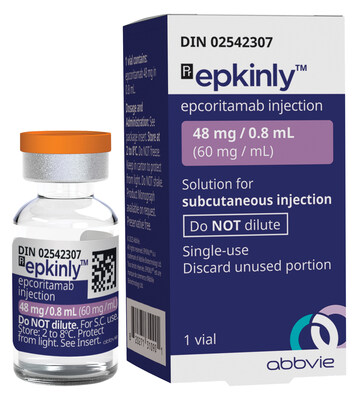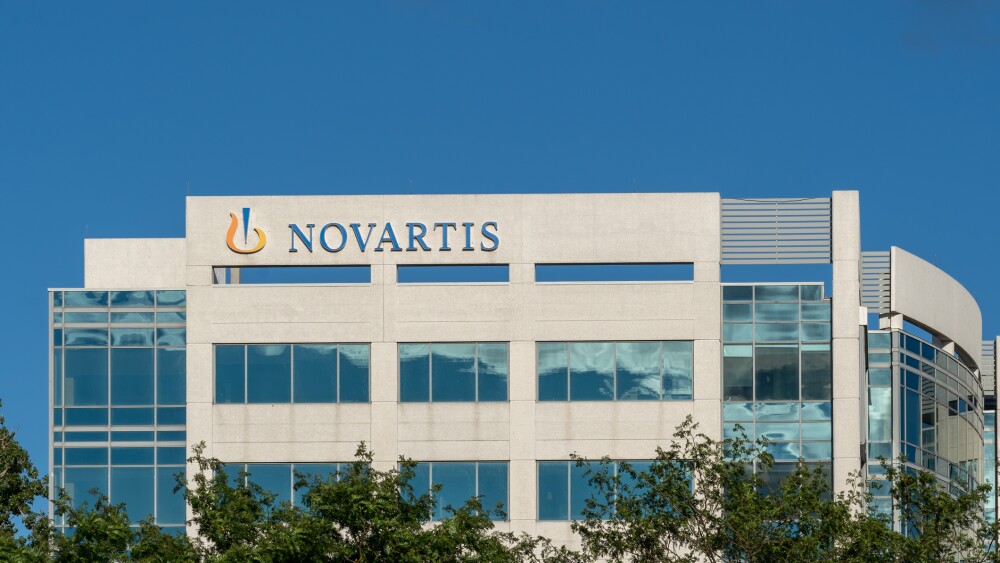- Time-limited reimbursement (TLR) recommendation is a new Canada's Drug Agency (CDA) review process whereby a temporary recommendation is issued based on a phase II clinical data assessment, and the final recommendation is contingent upon a future reassessment of additional evidence (i.e., phase III clinical data)1.
- The positive CDA TLR recommendation recognizes the clinical efficacy of EPKINLY based on phase II data (EPCORE NHL-1), and benefits of subcutaneous administration to patients, healthcare professionals and the healthcare system.
- AbbVie has successfully completed its negotiations with the pan-Canadian Pharmaceutical Alliance (pCPA) and a letter of intent (LOI) has been signed by both parties.
MONTREAL, July 23, 2024 /CNW/ - AbbVie (NYSE: ABBV), today announced that Canada's Drug Agency (CDA, formerly CADTH) has issued its first-ever Time-Limited Reimbursement (TLR)2 recommendation for EPKINLY (epcoritamab). This recommendation recognizes the unmet need of adult patients with Relapsed or Refractory Diffuse Large B-Cell Lymphoma (R/R DLBCL) after two or more lines of systemic therapy and who have previously received or are unable to receive CAR-T cell therapy. EPKINLY has also received a positive recommendation for the same indication from INESSS to list it in Quebec contingent on submission and reassessment of phase III clinical data once available.3
As the first company to undertake the new process to bring a medicine to market through the TLR process, AbbVie is committed to doing its part to accelerate access to treatments with promising value and is working together with CDA, pCPA and the provincial drug plans to support the success of Canada's first early patient access pathway. The pCPA developed a set of principles and conditions for a pCPA Temporary Access Process (pTAP)4 that inform the negotiation process and potential product listing agreements for any drugs that receive a positive TLR recommendation. AbbVie has successfully closed its negotiation with the pCPA through the new pTAP pathway and has signed a letter of intent (LOI). The next step is for public drug plans across Canada to list EPKINLY on the provincial and territorial formularies to provide coverage for patients.
"The TLR policy is an important milestone for Canadians hoping to obtain faster access to life-saving medicines for diseases that have limited treatment options," says Rami Fayed, Vice President and General Manager, AbbVie Canada. "EPKINLY is the first medication to be accepted through this process for its clinically meaningful phase II clinical data. This early access pathway is a positive step forward that recognizes that time is of the essence for Canadian patients, especially those living with serious illnesses."
"DLBCL is a cancer that can rapidly progress and resist treatment, so the sooner it is treated, the better," explains Dr. David MacDonald, Hematologist at The Ottawa Hospital. "When it comes to accessing innovative therapies like EPKINLY, where delays can impact both survival and quality of life, this accelerated pathway responds to the desire of physicians to give patients a better chance. With its encouraging clinical efficacy based on phase II data, EPKINLY may now be available sooner to address the unmet needs of patients with 3L+ DLBCL."
"We are hopeful that the new TLR pathway will lead to the faster availability of, and easier access to lymphoma treatments and treatments for other illnesses, for patients who need them," says Antonella Rizza, CEO, Lymphoma Canada. "Given how aggressive DLBCL is, we are thrilled that there is an additional treatment option available to patients when their cancer returns."
EPKINLY received Health Canada marketing authorization with conditions in October 2023 pending the results of a phase III clinical trial (EPCORE-DLBCL-1) to verify the clinical benefit. It is a subcutaneous T-cell engaging bispecific antibody for the treatment of adult patients with relapsed or refractory (R/R) diffuse large B-cell lymphoma (DLBCL) not otherwise specified, DLBCL transformed from indolent lymphoma, high grade B-cell lymphoma (HGBCL), primary mediastinal B-cell lymphoma (PMBCL) or follicular lymphoma Grade 3B (FLG3b) after two or more lines of systemic therapy and who have previously received or are unable to receive CAR-T cell therapy.5 EPKINLY is being co-developed by AbbVie and Genmab as part of their oncology collaboration.
Full details on the recommendation, including conditions for reimbursement, are available on the CDA website.
About DLBCL
DLBCL is a type of aggressive, fast-growing non-Hodgkin's lymphoma (NHL), a cancer that develops in the lymphatic system and affects B cells, a type of white blood cell. DLBCL is the most common type of NHL. Although DLBCL is often curable, many patients are refractory to, or relapse after first-line treatment with standard chemoimmunotherapy. For relapsed and refractory patients, several targeted therapies including T-cell mediated treatments have recently emerged. However, readily available subcutaneous single agent therapies are limited.6,7,8,9
About EPKINLY
EPKINLY is an IgG1-bispecific antibody created using Genmab's proprietary DuoBody® technology. Genmab's DuoBody-CD3 technology is designed to direct cytotoxic T cells selectively to elicit an immune response towards target cell types. It is designed to simultaneously bind to CD3 on T cells and CD20 on B-cells and induces T cell mediated killing of CD20+ cells.5,10,11,12 EPKINLY comes as a concentrate for solution, for SC injection, with each vial containing 4 mg in 0.8 mL (5 mg/mL) and a solution for SC injection, with each vial containing 48 mg in 0.8 mL (60 mg/mL) of epcoritamab.
Please consult the EPKINLY Product Monograph at https://www.abbvie.ca/en/our-science/products.html.
About AbbVie in Oncology
At AbbVie, we are committed to transforming standards of care for multiple blood cancers while advancing a dynamic pipeline of investigational therapies across a range of cancer types. Our dedicated and experienced team joins forces with innovative partners to accelerate the delivery of potentially breakthrough medicines. We are evaluating more than 20 investigational medicines in over 300 clinical trials across some of the world's most widespread and debilitating cancers. As we work to have a remarkable impact on people's lives, we are committed to exploring solutions to help patients obtain access to our cancer medicines.
About AbbVie
AbbVie's mission is to discover and deliver innovative medicines and solutions that solve serious health issues today and address the medical challenges of tomorrow. We strive to have a remarkable impact on people's lives across several key therapeutic areas – immunology, oncology, neuroscience, gynecology and eye care – and products and services in our Allergan Aesthetics portfolio. For more information about AbbVie, please visit us at www.abbvie.ca. Follow AbbVie Canada on X, Instagram, or LinkedIn.
References |
_____________________________ |
1 CADTH Procedures for Time-Limited Reimbursement Recommendations: https://www.cadth.ca/sites/default/files/Drug_Review_Process/CADTH_Time_Limited_Procedures.pdf |
2 CADTH Reimbursement Review - CADTH Reimbursement Recommendation. Epcoritamab (Epkinly): https://www.cadth.ca/epcoritamab |
3 INESSS: Drug products undergoing evaluation and evaluated: https://www.inesss.qc.ca/en/themes/medicaments/drug-products-undergoing-evaluation-and-evaluated/extract-notice-to-the-minister/epkinly-6950.html |
4 pCPA Temporary Access Process (pTAP): https://www.pcpacanada.ca/pCPATemporaryAccessProcess |
5 Epkinly (epcoritamab injection/for injection) product monograph. AbbVie Corporation. Available at: https://www.abbvie.ca/en/our-science/products.html. October 2023. |
6 What is Lymphoma. Lymphoma Coalition. https://lymphomacoalition.org/what-is-lymphoma/. Accessed April 24, 2023. |
7 Kanas G, Ge W, Quek RGW, et al. Leukemia & Lymphoma. 2022;63(1):54-63. |
8 Crump M, Neelapu SS, Farooq U, et al. Blood. 2017;130(16):1800-1808. |
9 Chao MP. Cancer Manag Res. 2013;5:251-269. |
10 Engelberts PJ, Hiemstra IH, de Jong B, et al. "DuoBody-CD3xCD20 induces potent T-cell-mediated killing of malignant B cells in preclinical models and provides opportunities for subcutaneous dosing." EBioMedicine. 2020;52:102625. DOI: 10.1016/j.ebiom.2019.102625. |
11 Rafiq S, Butchar JP, Cheney C, et al. "Comparative Assessment of Clinically Utilized CD20-Directed Antibodies in Chronic Lymphocytic Leukemia Cells Reveals Divergent NK Cell, Monocyte, and Macrophage Properties." J. Immunol. 2013;190(6):2702-2711. DOI: 10.4049/jimmunol.1202588 |
12 Singh V, Gupta D, Almasan A. "Development of Novel Anti-Cd20 Monoclonal Antibodies and Modulation in Cd20 Levels on Cell Surface: Looking to Improve Immunotherapy Response." J Cancer Sci Ther. 2015;7(11):347-358. DOI: 10.4172/1948-5956.1000373. |
SOURCE AbbVie Canada







